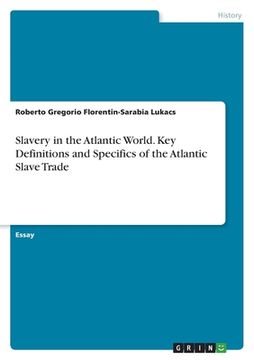Share
Slavery in the Atlantic World. Key Definitions and Specifics of the Atlantic Slave Trade (in English)
Roberto G Florentin-S Lukacs
(Author)
·
Grin Verlag
· Paperback
Slavery in the Atlantic World. Key Definitions and Specifics of the Atlantic Slave Trade (in English) - Roberto G Florentin-S Lukacs
$ 32.72
$ 40.90
You save: $ 8.18
Choose the list to add your product or create one New List
✓ Product added successfully to the Wishlist.
Go to My WishlistsIt will be shipped from our warehouse between
Monday, July 08 and
Tuesday, July 09.
You will receive it anywhere in United States between 1 and 3 business days after shipment.
Synopsis "Slavery in the Atlantic World. Key Definitions and Specifics of the Atlantic Slave Trade (in English)"
Essay from the year 2020 in the subject History - World History - Basics, grade: 9.0, University of Pompeu Fabra, language: English, abstract: The term slavery is a broad definition and a wide-ranging concept which is not always being accurately applied. In the emerging colonial area of the 16th and the following centuries up until the 19th century the term had regained new dimensions of definition. A new form of slavery with an economic element on a scale of several centuries had emerged. The Atlantic slavery had reshaped the terminology and is nowadays responsible for the widespread view on the slave trade of the colonial period. Specifically, how do we understand slavery and what are some of the key definitions of it that marked the Atlantic slave trade and made it distinguishable from the other types of slave trade that had existed throughout mankind's history and periods? One important aspect was that slavery in the form of the Atlantic slave trade was its institutionalized character. It was, even though loosely, a representative body, an institution with norms and traits of certain people with a certain cultural background. In the exemplary essay of David Eltis on "The volume and structure of the transatlantic slave trade: A Reassessment" specific European empires and their trading culture were being more thoroughly researched such as the British, the Spanish, the Portuguese, the Dutch, the French and to some extent the Danish commercial Atlantic trade. Another three key elements of the Atlantic slave trade are the implications of violence, exercised by humans upon other humans, implied physical coercion, the forceful commitment to hard and dirty labor, and implied restrictions in the freedom of mobility.
- 0% (0)
- 0% (0)
- 0% (0)
- 0% (0)
- 0% (0)
All books in our catalog are Original.
The book is written in English.
The binding of this edition is Paperback.
✓ Producto agregado correctamente al carro, Ir a Pagar.

